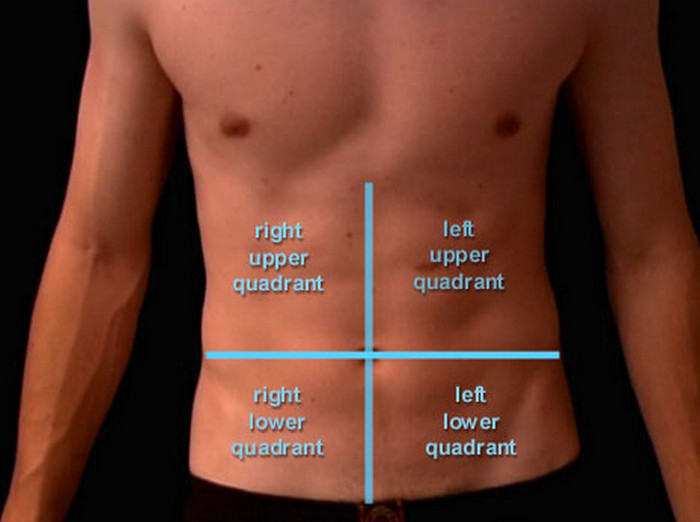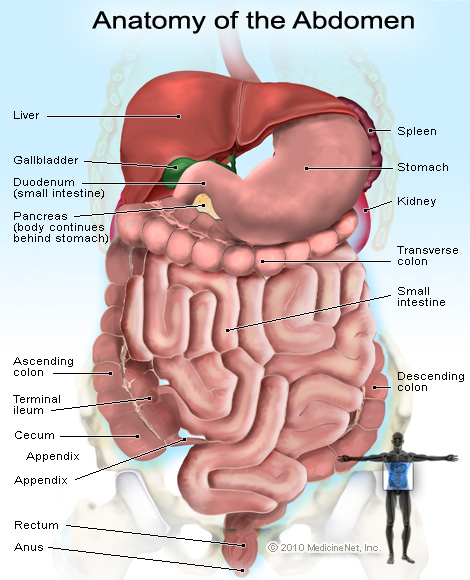If you describe your symptom as a “pain in my right side”, then you are experiencing a type of abdominal pain that could be a symptom of any one of a number of illnesses. This is different from a generalized abdominal pain and to have pain that you can pinpoint to a specific side or area can help your doctor to make a fast diagnosis. There are many reasons you may have a pain in your right side - bacteria and viral infections are all associated with this type of pain. Keep reading to learn more information about it.
Why Do I Have Pain in My Right Side?
 In medicine, the abdomen is divided into four quadrants. The imaginary axis lines run through the belly button. By dividing this area of the body into four sections, it is easier for doctors to identify the location of pain and to locate other potential issues in the abdominal area. Each area has a set of organs and functions that are particular towards it. The quadrants are divided into upper and lower sections with a left and right in each.
In medicine, the abdomen is divided into four quadrants. The imaginary axis lines run through the belly button. By dividing this area of the body into four sections, it is easier for doctors to identify the location of pain and to locate other potential issues in the abdominal area. Each area has a set of organs and functions that are particular towards it. The quadrants are divided into upper and lower sections with a left and right in each.
Know the Important Organs in the Right Side
When you are identifying the area in which you have pain, it is important to know that the right side of your body corresponds with the upper right quadrant and lower right quadrant of the medical division of the abdomen. The organs in this section are:
 Right Upper Quadrant:
Right Upper Quadrant:
- Liver
- Gall bladder with biliary tree
- Duodenum
- Head of pancreas
- Right kidney and adrenal gland
- Hepatic flexure of colon
Right Lower Quadrant:
- Cecum
- Appendix
- Ascending Colon
- Right ovary and Fallopian tube
- Right ureter
Causes of Pain in Right Side
There can be many different causes of pain in the right side of your abdomen. If you are wondering “what causes pain in my right side?” the answer can be just about anything. There are muscles and rib joints in this area that can become injured and inflamed. Besides, the lower lobe of the right lung extends into these quadrants and can create pain due to pneumonia, clotting and aggravated pleurisy. Below are some of the common problems related with the pain.
Appendicitis
Your appendix is located in the lower right quadrant of your abdomen. It can become inflamed, causing it to swell and requiring that it be surgically removed. This is a life threatening condition. The symptoms common to it are dull or sharp pains in the right side of the abdomen, fever, abdominal swelling and nausea.
Ovarian Cyst
If you have ovarian cysts and develop pain in your right side, there is a chance it could have been caused by the cyst twisting or rupturing. This is normally characterized by a strong moderate pain, or a sudden sharp pain in the area. The pain can radiate down to the right thigh and cause nausea and/or vomiting.
Ectopic Pregnancy
An ectopic pregnancy is when fertilization of the egg occurs outside of the uterus, most likely in the ovary or fallopian tube. As the embryo begins to grow, it can cause a severe pain on the right side. This pain may go up to the same shoulder too. It is also associated with the symptoms of vaginal discharge and light headedness. If a woman has missed her period for over 10 weeks and is experiencing these symptoms, she may have an ectopic pregnancy. This is a life threatening condition and emergency care should be sought immediately.
Kidney Stone
The defining symptom of a kidney stone is severe pain in the abdomen that starts on the side and radiates down into the entire lower abdomen. There may also be pain when urinating and the urine may be tinged red. The pain also can come in waves too. If it is accompanied by nausea, vomiting, fever or the inability to sit without severe pain, it is a serious issue and you must seek medical help.
Gallstones
Gallstone attacks are often mistaken for heart attacks as the pain is located on the right hand side of the body, under the ribs and radiates up to the shoulder blade. Before an attack, there may be pain in that area, or centered across the two upper quadrants that appears to be tied to eating as well. Other symptoms include nausea, vomiting and sporadic sweating.
Gallstones form in the gallbladder and can block the flow of bile. If they do so for too long, that bile cannot reach the pancreas, small bowel and other organs. If this happens, you have a condition known as acute cholecystitis and your gallbladder will need to be removed. Bile flow is an essential part of your body's ability to function and inflammation of the gallbladder is very serious.
Other Causes of Pain in Right Side
- One of the possible causes could be an open sore in the lining of your stomach or the portion of the small intestine closest to the stomach (duodenum). These sores can bleed and are also sometimes called a perforated stomach ulcer.
- IBS - Irritable bowel syndrome has become easier to diagnose and is recognized as one of the most common causes of the complaint “I have a pain in my right side.” IBS symptoms include bloating, constipation and diarrhea. It is relieved upon voiding.
- IBD - Inflammatory bowel disease is not to be confused with IBS. It is a chronic inflammatory condition that interrupts proper digestive functioning. It can be a part of Crohn’s or Ulcerative Colitis.
- UTI - Often overlooked as a potential cause, a chronic or recurring UTI (urinary tract infection) can cause pain in your right side that is also usually seen with a burning feeling when you void.
- Constipation, especially higher up in the colon, can cause significant pain in the right upper quadrant. It isn’t just fecal matter that is not moving, but the bloating can cause discomfort too.
- Menstrual cramps - this can surprise some women who don’t expect that the cramping can cause pain that far up in the abdominal cavity, but it can.
- GERD or heartburn can also cause pain in your right side.
When to Worry
For most of the conditions that are serious, the sharpness of the pain and discomfort will be enough of a red flag to send you to the doctor. There are some serious indicators that you may need emergency care - even if the pain is not all that bad. If you have any blood in your stool, a fever, the pain gets worse, or have nausea and vomiting that is severe - go to your local ER for treatment.
